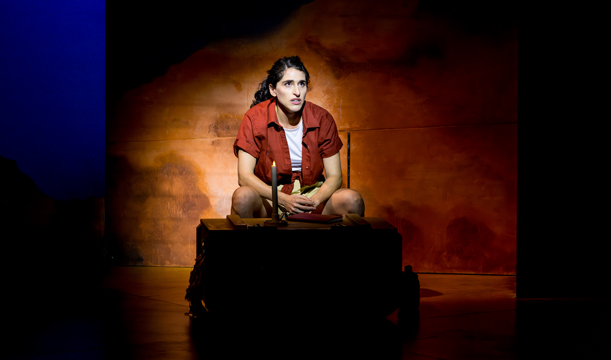By Alix Cohen
Hannah Senesh – an anglicized Hannah Szenes, (1921-1944) is revered by Jewish people as a symbol of courage, resistance, and Zionist idealism—an enduring heroine of World War II. Of all the young people who willingly died for Jewish independence, why dramatize this one? The young woman was captured mere hours after landing to undertake her assignment. When tortured, she withheld information that might’ve meant the death of countless others. She was a poet and, like Anne Frank, kept diaries.
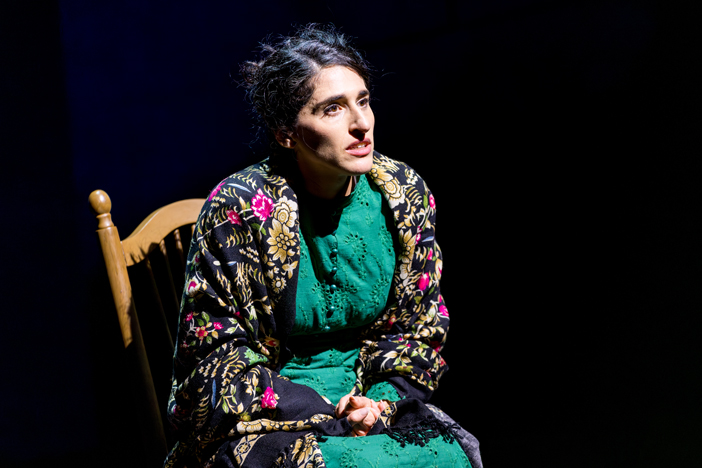
The play is book-ended by portrayal of Hannah’s mother, Catherine, who lived long enough to see it performed, albeit in a home for the elderly. At the start, she’s brought to catch a glimpse of the daughter she thought was in Palestine locked in a Hungarian prison. Blackout. Jennifer Apple plays both women.
We observe teenage Hannah. A gifted student, the girl was accepted at a Protestant private school. These years are the sole weak narrative parenthesis. Acting is exaggerated. An inordinate amount of time is spent concerned with a dress.
As Anti-Semitism grew in Budapest, the girl joined a Zionist Youth Movement promoting need for homeland in Israel. The fourth wall drops as Hannah explains her feelings and appeals to audience for understanding. Friends convert to Catholicism. “In Hungary, Jews are not allowed to serve in the military except in the line of fire.”
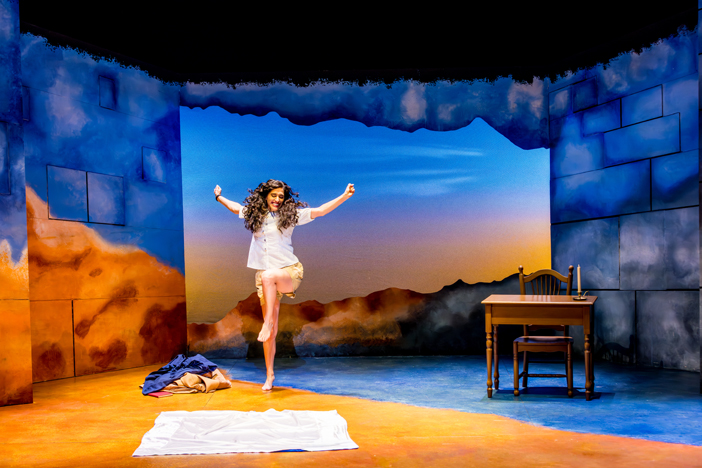
“I read how Martin Buber envisioned a Jewish homeland,” she tells us, flame igniting. Buber’s view was “to achieve a truly great life for the people of Israel, a great peace is necessary with neighboring peoples.”
Though she wanted to be a writer, the heroine decides a better way to serve would be to study agriculture and help “seed” Palestine. She gleefully folds her admission letter into a paper plane and sails it out over the audience. (terrific) “I need to feel my life has meaning, that I’m needed in this world.”
Hannah travels to Israel, attends a girls’ agricultural school, and joyfully becomes part of a kibbutz. Next, she joins Haganah, the organization that that laid foundation for Israeli Defense Forces. “France has already negotiated a shameful peace…We’ve heard unbearable stories of what’s going on.”
Increase in commitment is condensed, but not so much that we don’t believe the passion that drives her. In 1943, Hannah enlists in The British Women’s Auxiliary Air Force and is recruited into special operations training. She’s all of 22. “All the darkness can’t extinguish a single candle, yet one candle can illuminate all the darkness.”
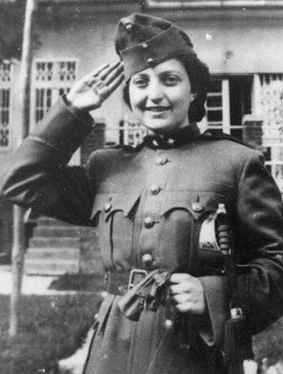
Over the next two years, Jewish parachutists were dropped behind enemy lines to assist allies and Jews in occupied Europe. Volunteers received training in parachuting, sabotage, radio transmission and survival. Out of two hundred fifty candidates, thirty-two were chosen. Three were dropped in Yugoslavia.
Hannah is blown off course away from her peers and arrested alone. As staged, the moment is startling. In truth, three arrived at the Hungarian border and were detained together. They carried a British transmitter. Hannah knew the code. She was tortured, revealed nothing, and was summarily brought before a firing squad.
The heroine kept a diary until her last day: “The dice have rolled. I have lost.” It was published in 1950. Her remains were brought back to Israel where they’re buried on Kibbutz Sdot Yam. After the Cold War, a Hungarian military court exonerated her of treason.
Like The Unknown Soldier and Anne Frank, one young woman stands for thousands. Anti-Semitism is once again rising like virulent weeds, models of bravery and action are all the more important. The bottom line is not to turn one’s eyes away.
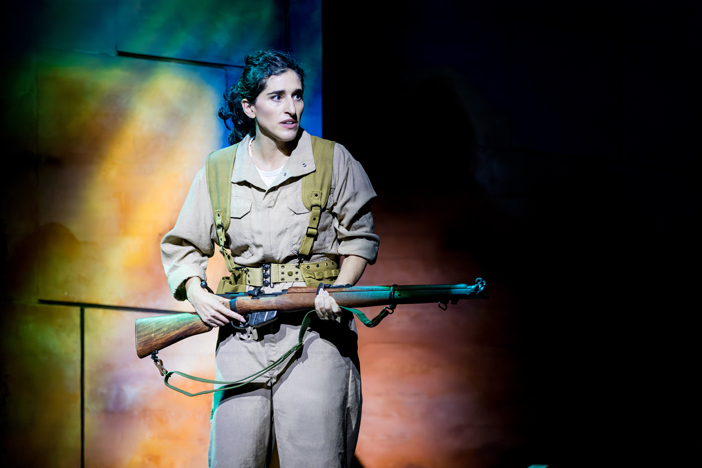
Jennifer Apple is remarkable. Mrs. Senesh is crushed, stoic, and proud. Hannah exudes joy and steely determination. The actress seems to conjure what’s happening around her character. Poetry wrenches out. And she sings well.
Also featuring Simon Feil as the voices of Hannah’s brother and a Nazi
David Schechter’s Direction features excellent pacing, credible stage business, and good characterization but for Hannah’s teenage years.
Scenic Design (Court Watson) effectively straddles mood and history with impressionistic cinder blocks and landscape brought to varied life by Lighting Designer Vivien Leone
Note to Props (Kristen Vanderlyn) – we can SEE that there’s nothing written in the diary.
Sound is effective and pristine (Dan Moses Schreier)
Score, by Steven Lutvak, is wonderful, symbiotic.
Costumes (Izzy Fields) all seem right except a dress meant for teenage Hannah which looks like something out of a Disney cartoon. Layered changes keep narrative fluid.
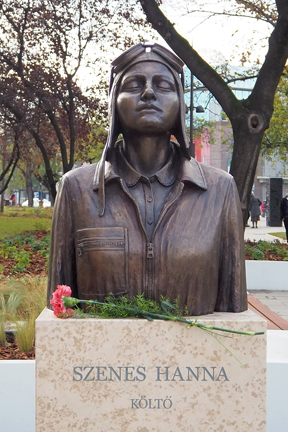
Memorial in Budapest (Public Domain)
“A Walk to Caesarea” :My God, my God,/may it never end –/the sand and the sea,/the rustle of the water,/the lightning of the sky,/the prayer of man.(Hannah Senesh- put to music by David Zehavi)
Photos by Tricia Baron
National Yiddish Theatre Folksbiene presents
Hannah Senesh
Written and Directed by David Schechter
Based upon the diaries and poems of Hannah Senesh (1921-1944)
With additional songs by Elizabeth Swados and David Schechter
Developed in collaboration with/originally performed by Lori Wilner
Theater Row
Through November 9, 2025

